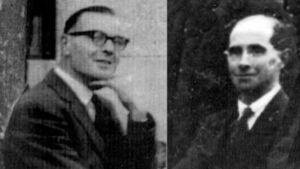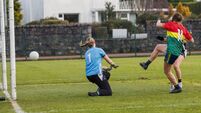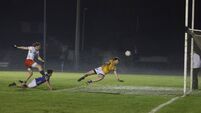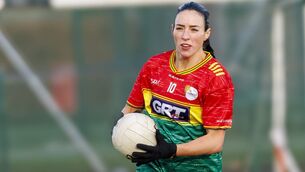“THERE’S NOTHING STANDS THE WEATHER LIKE THE MORRIS-KELLY LINE”

Jim Morris (left) and Tommy Lynch (right)
BROWSING through an old scrapbook which had been loaned to my father by Paddy Reddy, a famed local cyclist of yesteryear, I was fascinated by the faded reports of the daring deeds of the ‘Carlow Rover’. There was even a poem written about the powerful peddler but it was another poem which really caught my eye. Out towards the back of the scrapbook the cycling gave way to football, a few cuttings from famed ’44 lovingly pasted in.
The line above jumped out at me. “There is nothing stands the weather like the Morris-Kelly line.” You see it was 1973, my sister Marianne had just started her first teaching job and to the delight of this GAA mad teenager she was stationed in Ballon where her Principal was Jim Morris, the great Carlow footballer of bygone days.
I had read in the ‘Football Immortals’ of how Morris had, with Luke Kelly formed an outstanding mid-field partnership on the Carlow team that won the county its lone Leinster Senior Football Championship title in 1944, then rattled the mighty Kingdom in the All-Ireland semi-final in Croke Park. Attending funerals with my father I saw old men nearly turn misty eyed when talk came to ‘the Morris-Kelly line’, swashbuckling captain ‘Peenie’ Whelan and will o’ the wisp raider Jimma Rea. “All Leinster men, great men, a match for the best in Ireland,” I remember one old stager declaring “but Kelly and Morris were the Daddy’s of them all.” Now my sister was working with Jim Morris. He quickly joined Jimmy Smyth, the Clare hurler, as my favourite star of the past.
Then, that same year, 1973, playing with the Tinryland Under 14 footballers I was virtually in awe of our Ballon-Rathoe opponents. No disrespect to John Browne, Mr Delaney or Mick McAssey but Ballon’s half-time pep talk in Bro Leo Park, Tullow was being conducted by Jim Morris! The Jim Morris! I remember looking over at their huddle and wondering what wondrous words of wisdom accompanied the little gesticulations. Some 35 years later, courtesy of a sixteen page special on Jim Morris in the 2008 ‘Ballon-Rathoe Chronicle’ I was to find out.
Recalling his involvement with juvenile teams Jackie Byrne writes. “He will be well remembered for his tireless and enthusiastic work in training school teams to take part in Primary Schools competitions. Ballon joined with Rathoe NS to form parish teams for this purpose.We all remember well his refrain of ‘go for the ball, don’t wait for it to come to you’ which was sound advice for any young player. A word which he often used too was ‘lackadaisical’ in exhorting his young charges to greater effort on the field. It was a word which certainly didn’t apply to his own football career. While Ballon-Rathoe didn’t enjoy a lot of success in terms of winning championships, he always gave the impression that togging out, playing and enjoying the game was the most important thing.” If Jim Morris never kicked an inter-county or inter-provincial football isn’t that a beautiful legacy to have left behind, inculcating a love of the game in the pupils of his parish. But Jim Morris did kick inter-county and inter-provincial football, a career captured in magnificent detail by Brendan Donohue, himself a former Carlow inter-county footballer, in that 2008 ‘Chronicle’ special.
In ‘The Nationalist’ this week Jim Morris and his victorious colleagues of ’44 are remembered in ‘Glory Years’, a special supplement to mark the 80th Anniversary of that powerful Provincial triumph and the fact that the publication date is July 30th means that the commemorative magazine appears on the exact date ‘the great Leinster final was held in Athy’.
To the two Ger’s, Ger Doyle the Carlow PRO for floating the idea and Ger McNally, ‘The Carlow Nationalist’ sports editor, a big thank you for making this supplement a reality and our hope is that you get as much enjoyment out of reading it as we did in compiling what we hope will become a coveted piece of GAA memorabilia.
The ‘Morris-Kelly line’ verses first saw the light of day on Saturday, July 29th in the ‘Ogled Out in Old Leighlin’ column in ‘The Nationalist’ as the local correspondent previewed the Leinster final. The following week when celebrating his county’s victory the scribe again took to verse, verse which has echoed down the corridors of time as his bouncy rhyme became the ‘Carlow Fifteen’, a song sung at many’s a session for decades after.
The author passed away in 1977 and in an Appreciation penned by M-H we read : By the death of Tommy Lynch, Old Leighlin and indeed the whole of Leighlin parish has lost one of its most notable and colourful characters of the past 50 years. He was held in great esteem by everyone and was scholarly, witty and knowledgeable while remaining always ‘one of the boys.’ For years he was district correspondent for ‘The Nationalist’ and his column ‘Ogled Out in Old Leighlin’ was read not only by the locals but all over the county and was a joy for emigrants. He could, if the occasion demanded it, be playwright, producer and actor on stage and could ad lib at the drop of a hat. His verses were famous in his column along during the 30’s and 40’s and ranged from national to local events. Carlow’s year of GAA glory especially comes to mind.
In the year forty-four towards the end of July, The great Leinster final was held in Athy, This game of fine football was listed between, The lads from the Liffey and the Carlow fifteen.
Socially, he put his own village on the map, breaking into verse over many of the doings there - like the formation of the village band when “ … a goat came strolling down the glen, and in the dark unseen, she nobly died and gave her hide to make a Tamborine … “ He was a great encouragement to the young of his day with a true sense of community and co-operation. It was good to have known him. May he Rest in peace.” Historian and author Martin Nevin from Leighlinbridge, a great admirer of Tommy Lynch’s chronicles, compiled a book titled ‘Ogled Out in Old Leiglin - the writings of Tommy Lynch.’ In its introduction Martin wrote: “Through his tales and poems he gives an account of the district for miles around his native place as he knew it in his time.’ He said that Tommy had an inimitable turn of phrase and was widely read. You will get to experience Tommy’s entertaining turns of phrase in our supplement which brings you not only the story of Carlow’s 1944 triumph but of the years leading up to that historic occasion with The ‘Foot and Mouth’ outbreak of 1941 which arguably cost Carlow that years title and the 1942 campaign when Carlow were Leinster champions for 24 hours all covered.
Also covered, of course, is the 1944 All-Ireland semi-final but in a very unique ‘Every Kick of the Ball’ piece. The report-cum-commentary of that Kerry game was unearthed some years ago in Matt Lynch’s of Old Leighlin. Found among the memorabilia of former Carlow Co. Secretary, Martin Lynch, it was tightly typed on brown paper and taking up some eight pages it gives a fascinating account of that semi-final. Given that Martin Lynch was a brother of Tommy’s is very probable that Tommy was responsible for the fascinating work. The fact that we read in ‘Ogled Out in Old Leighlin’ the Saturday after the semi-final that “in everybody’s life there is something which stands out above all as an event of pleasurable emotion, and to us, Carlow folk on the home front on Sunday, this came when the commentators fresh young voice flashed out the news that the teams were taking the field” gives further credence to the claim that Tommy Lynch produced ‘every kick of that ’44 ball. The extent of its detail would suggest that the person listening to Michael O’Hehir’s commentary on the wireless took shorthand notes to record the action and then had these notes typed out. To the best of our knowledge nothing of similar detail on major matches exists in any other county, suggesting this was a ‘made in Carlow’ once off.
Our ‘Here’s one for you’ segment has lain dormant over the last few weeks but we revive it for this 1944 ’Special’ and ask ‘What, apart from the fact that they were famous firsts have Carlow’s first Leinster SFC triumph and Shamrock Rovers winning of their first League of Ireland Division 1 soccer title in season 1922-23 got in common?” The answer will be found in the ‘Glory Years’ supplement accompanying this week’s paper.




